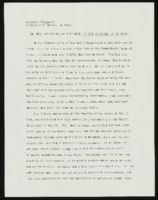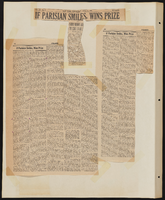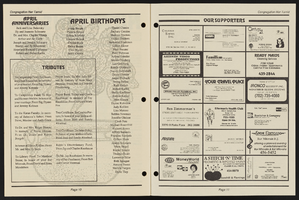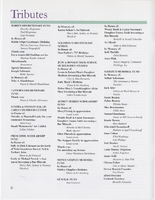Search the Special Collections and Archives Portal
Search Results

Transcript of interview with Patsy Brinton, Margaret Carnell, and Sharon Schmitt by Lois Goodall, April 30, 2014
Date
Archival Collection
Description
In 1905 a twenty-two-year-old second-generation Swiss American left Los Angeles with a friend for Lincoln County, Nevada. Edward "Ed" Von Tobel (1873-1967) and his friend Jake Beckley had heard about some land that was going up for auction. Together they purchased a parcel on the second day in the new desert town of Las Vegas, where they established Von Tobel's Lumber Company, which served Southern Nevada from 1905 until it closed in 1976. In Las Vegas Von Tobel met and married fellow German-speaker Mary Hameril, and together the couple raised four children in the city: Jake, Katherine Elizabeth, Ed Jr., and George. Many Von Tobel descendants live here still. Margaret Carnell, granddaughter of Ed Von Tobel and Mary Hameril and the oldest of three daughters of Elizabeth Von Tobel and Kenneth Zahn, was born in Las Vegas in 1939. After attending Arizona State University Margaret married in Phoenix, Arizona, in 1958 Margaret raised two children in Scottsdale, Arizona, before returning to Las Vegas in 1983. Margaret manages the Von Tobel family properties and in her spare time likes to travel. Patricia "Patsy" Brinton is the second daughter of Elizabeth Von Tobel and Kenneth Zahn. Like her sisters Patsy was raised in Las Vegas, where in 1972 she married real estate broker Robert Brinton. The Brintons raised two daughters and a son. Like her cousin Sharon, Patsy donates considerable volunteer hours through Assistance League of Las Vegas and Junior League of Las Vegas. Patsy enjoys traveling and playing golf and tennis. Sharon Schmitt, the second of four daughters of Edward Von Tobel Jr. and Evelyne Leonard, was born in Las Vegas in 1940. In 1963 in Las Vegas Sharon married Larry Schmitt, an agent for Allstate Insurance. Besides enjoying traveling and playing tennis, Sharon has long been an active community volunteer through Assistance League of Las Vegas, Junior League of Las Vegas, and Saint Elizabeth Ann Seton Catholic Church. Together the Schmitts raised a family of three children, who still live in Las Vegas and are raising the next generation of the Von Tobel family.
Text

Transcript of interview with Cheryl Leonard by Claytee White, February 12, 2013
Date
Archival Collection
Description
First arriving in Las Vegas as an infant, Cheryl Leonard's young life included a brief sojourn in Southern California before returning to Las Vegas in 1954. After attending local elementary and middle schools, she started at Rancho High during the day, and working at the Huntridge theater in the evenings and during the summers. More than just work, though - in this interview, Cheryl recalls school activities from parades to pep club, participating in Helldorado, hanging out with her friends at the Blue Onion and shopping on Fremont Street. After graduation, Cheryl returned to California to attend school before coming back to Las Vegas and taking a job with the Central Telephone Company. This was followed by a brief stint working at the Nevada Test Site before she married in 1964 and concentrated on raising her own daughters in a rapidly growing and changing Las Vegas.
Text

Ashok Mirchandani oral history interview: transcript
Date
Archival Collection
Description
Oral history interview with Ashok Mirchandani conducted by Kristel Peralta, Cecilia Winchell, and Stefani Evans on March 11, 2021 for the Reflections: The Las Vegas Asian American and Pacific Islander Oral History Project. In this interview, Mirchandani discusses his early life in Kolkata, West Bengal, India and arriving to Las Vegas, Nevada in 2002. He talks about Indian traditions he celebrates and Indian festivals in the United States. Mirchandani recalls his employment with the State of Nevada, becoming the Director of the Department of Business and Industry, and advocating for small businesses. Later, Mirchandani describes the importance of minorities in politics, engaging in policy making, and the need for Asian Americans in public services. Lastly, Mirchandani discusses the model minority myth, developing the Nevada Home Retention Program, and emphasizes children's mental health.
Text

Transcript of interview with Freddie Glusman by Barbara Tabach, October 29, 2015
Date
Archival Collection
Description
In this interview Glusman discusses his early memories of being raised in Vancouver, Canada and how he ended up in Las Vegas. He reflects on how he first got his start in the town and his early dealings with casinos and their owners while he was working as a carpet and drapery salesman and while working for Fabulous Magazine. Glusman explains how he started his restaurant and tells about the people he encountered while doing this that where significant to both the Jewish community and Las Vegas as a whole. He recounts stories that include such people as Meyer Lansky, Al Sachs, and Moe Dalitz.
Text

Lynnette Sawyer oral history interview: transcript
Date
Archival Collection
Description
Oral history interview with Lynnette Sawyer conducted by Nathalie Martinez on January 03, 2019 for the Latinx Voices of Southern Nevada Oral History Project. Barbara Tabach and Laurents Bañuelos-Benitez also participate in the questioning. Lynnette Sawyer identifies as a Puerto Rican woman born and raised in Spanish Harlem in New York. Her ancestry extends from Spain to Africa and has helped her identity, as she became an educator and museum curator. She describes her life in New York and her journey to Las Vegas. As the founder of the Hispanic Museum of Nevada, she wanted to create a space that would teach young Latinos about their history and heritage.
Text

Catherine Cortez Masto oral history interview: transcript
Date
Archival Collection
Description
Oral history interview with Catherine Cortez Masto conducted by Claytee D. White on August 10, 2018 for the Latinx Voices of Southern Nevada Oral History Project. Catherine Cortez Masto grew up in Las Vegas near where the town ended and the desert began, which at that time was near Decatur and Pennwood. She grew up playing in the streets and riding horses and motor bikes with girlfriends and cousins. Her father, Manny Cortez, began as a valet at the Dunes before entering politics. He served 16 years on the County Commission and then 13 years as the chief of the Las Vegas Convention and Visitors Authority. As the head of the LVCVA, Manny oversaw campaigns to increase tourism, enlarge McCarran International Airport, improve taxicab service, and served as a visionary for the entire region. Catherine followed in her father's footsteps while being her own woman and making her own mark on the region. She attended college at UNR and law school at Gonzaga University School of Law. After a clerkship, she worked for a small local Las Vegas firm for 4 - 5 years, then moved to the governor's and then served two terms as Nevada's Attorney General. Currently she's in the US Senate with committee assignments that include Banking, Housing and Urban Affairs; Energy and Natural Resources; Commerce, Science, and Transportation; Rules and Administration; Indian Affairs, and the Committee on Aging. Subjects discussed include: Dunes, Manny Cortez, County Commission, LVCVA, Judge Carl Christensen, Judge Mendoza, Taxi Authority, Tourism, and Mike O'Callaghan.
Text

"An Impact of the Moulin Rouge Hotel on Race Relations in Las Vegas": manuscript draft by Roosevelt Fitzgerald
Date
Archival Collection
Description
From the Roosevelt Fitzgerald Professional Papers (MS-01082) -- Unpublished manuscripts file.
Text



